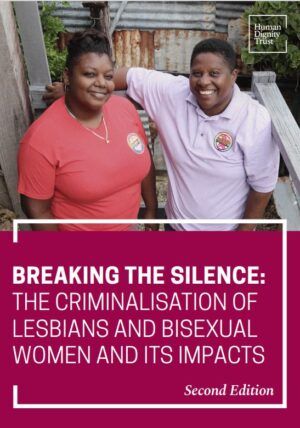Consensual same-sex intimacy between women is a crime in 40 jurisdictions across the world. In these jurisdictions in particular, lesbian, bisexual and queer (LBQ) women face unacceptably high levels of discrimination, stigma and violence – sometimes in ways that are shared with other members of the LGBT+ community, but often in ways that are unique. Despite this (and owing partly to relevant funding having been directed towards the HIV/AIDS response), research and activism tend to treat LGBT+ people as one homogenous group, with the focus often being centred on gay and bisexual men.
As a step towards centring the experiences of LBQ women, Human Dignity Trust’s updated report Breaking the Silence: Criminalisation of Lesbians and Bisexual Women and its Impacts explores the history and nature of laws criminalising consensual sexual intimacy between women, and the effects these laws have on their lives.
This includes exploring the origin and formulation of these laws, many of which are remnants of British colonialism, while numerous others are based on Sharia law. Some criminalise same-sex intimacy or certain acts between women explicitly, while others use gender-neutral language to criminalise any sexual intimacy that deviates from the heteronormative standard aimed at procreation.
The report shows that for LBQ women, like for other members of the LGBT+ community, criminalisation enables a hostile environment in which they experience arrest and prosecution, discrimination and violence. However, many aspects of the experience of LBQ women are unique, shaped by the particular intersection between criminalisation and gender discrimination. In societies where women already have so little power and control over their own lives, it is particularly difficult to be both a woman and a member of a stigmatised and criminalised sexual minority. This intersection creates vulnerabilities specific to LBQ women:
- A greater vulnerability to violence, control and abuse within their own families, including ‘corrective’ rape, a practice whereby abusers claim to ‘correct’ a victim’s sexual orientation.
- Particularly strong familial and societal pressures to enter into heterosexual marriages, or even being forced into marriage by one’s family, as it is simply not viable to live as a woman independent from male control.
- Less control over sexual and reproductive choices when in heterosexual marriages, which may lead to a lifetime of undocumented sexual abuse at the hands of their husband.
- Economic inequality, which worsens the human rights violations faced by LBQ women, as they are less able to live independently than GBQ men.
- Discrimination in education, employment, health and housing based on their sexuality and gender, particularly where LBQ women present in gender non-conforming ways and/or attempt to live independently from male control.
Criminalisation of same-sex intimacy therefore creates an environment which systematically undermines the fundamental human rights of LBQ women. This includes the rights to privacy, dignity, freedom of expression, physical and sexual autonomy, freedom from violence, and others.
Breaking the Silence explores landmark legal cases which demonstrate the importance of acknowledging the relationship between criminalisation and gender discrimination. This includes the 2022 decision by the United Nations Committee on the Elimination of Discrimination Against Women in Flamer-Caldera v Sri Lanka. The Committee found that laws criminalising female same-sex intimacy breach international human rights law, as they discriminate against women in an unlawful way. The Committee found that criminalisation: compounds discrimination; exacerbates and condones forms of gender-based violence; legitimises societal prejudice and gender stereotypes; and breaches the right to equal treatment of women in the family. This case sent an important message that any country which claims to respect women’s rights must respect the rights of all women, whatever their sexuality.
The report further shows that centring the experience of LBQ women comes with significant challenges. This includes issues related to a lack of reporting, with LBQ women often invisible to researchers, as well as having lower levels of influence in many societies in general. Furthermore, organisations fighting for the rights of LBQ women tend to be under-resourced and may face higher risks in their work. However, considering the unique experiences of LBQ women, and the intersections between criminalisation and gender discrimination, it is crucial that future research, activism and legal cases are tailored to the entire LGBT community, including LBQ women.
The experience of transgender and gender diverse people too is distinctive and under-researched. They are often particularly vulnerable to harassment, discrimination and violence, and are uniquely impacted by multiple types of criminalising laws. These experiences are explored in another Human Dignity Trust report, Injustice Exposed.
Ariane Adam is the Head of Legal at The Human Dignity Trust.
The report was supported by the Baring Foundation as part of its International Development programme.
